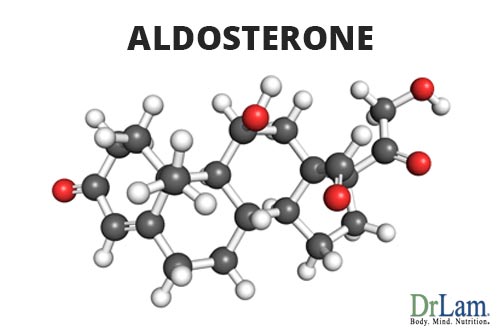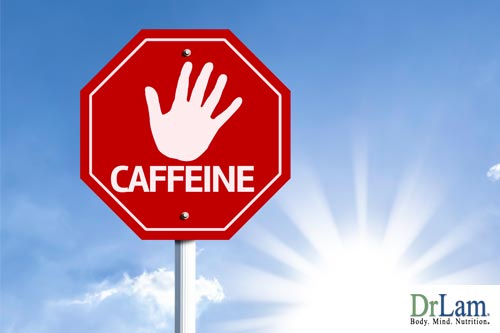 The average adult human body is fifty to sixty-five percent water. Those who are overweight will have more water compared to those who are lean. While one can survive fifty days or more without food, the body can only be depleted of water for a few days before survival is at risk. Maintaining optimum fluid balance, and not having an electrolyte imbalance, is important in achieving general good health. This is especially critical in Adrenal Fatigue Syndrome (AFS), where fluid dysregulation and electrolyte imbalance are common occurrences, especially in the advanced stages.
The average adult human body is fifty to sixty-five percent water. Those who are overweight will have more water compared to those who are lean. While one can survive fifty days or more without food, the body can only be depleted of water for a few days before survival is at risk. Maintaining optimum fluid balance, and not having an electrolyte imbalance, is important in achieving general good health. This is especially critical in Adrenal Fatigue Syndrome (AFS), where fluid dysregulation and electrolyte imbalance are common occurrences, especially in the advanced stages.
Fluid or electrolyte imbalance presents in a continuum. Conventional medicine, unfortunately, is versed mostly when fluid or electrolyte imbalance reaches extreme opposites, with severe dehydration on one extreme and a massive fluid overload at the opposite pole. Fluid overload clinically results in pulmonary edema, peripheral edema, and congestive heart failure. They are quickly resolved with administration of medications called diuretics that increase urine output to reduce body fluid load. Deficiency in fluid, or clinical dehydration, is clinically treated with fluid replacement.
Little attention is paid when fluid or electrolyte imbalance lies between the two extremes when symptoms can be evident but laboratory tests are normal. This is especially evident for those in the fluid depletion side of the spectrum. In this subclinical state of dehydration, signs and symptoms are mild and subtle at best. It is often missed and ignored as important contributing factors to ailing health.
For the healthy person, thirst is the first compensatory response to low fluid levels or an electrolyte imbalance. This is usually felt when the body has lost around two to three percent of its water. At the cellular level, however, damage begins to occur with as little as one percent loss of body water. Those with AFS fare worse. They can exhibit signs and symptoms of fluid and electrolyte imbalance and subclinical dehydration at a lower threshold and well before laboratory tests become positive.
We begin our discussion on electrolyte imbalance with first understanding how the body handles fluid or water as a whole.
Body fluids are comprised of intracellular and extracellular fluid. The intracellular fluid makes up about two-thirds of body water. The extracellular fluid makes up the remainder and consists of mainly interstitial fluids between the cells, plasma and lymph, spinal fluid, and in the GI tract.
Water moves from one compartment freely to another due to osmosis. Osmosis is influenced by dissolved solutes in fluids such as minerals and electrolytes. When each compartment of the body contains the appropriate concentration of water and electrolytes, the body is said to be in fluid balance. This is the way nature intended it to be. Problems begin to occur when one compartment has more fluid than others do.
The bulk of our daily body water needs come from food and drink that averages 2,300 ml per day. Another 200 ml is produced from our internal metabolic breakdown of nutrients. Together, the average total daily intake of 2,500 ml should equal the total output through the skin, lungs, kidneys and GI tract for the body to be in balance.
When our body is depleted of fluid, the brain initiates a chemical chain reaction that leads to a sensation of thirst by increasing the osmotic pressure of blood passing through the hypothalamus. We respond to thirst by taking in more fluid orally. When the body has too much fluid on board, the output is automatically increased, usually by way of the kidneys in those who are healthy.
 Water output is regulated by antidiuretic hormone (ADH) and aldosterone. Both hormones cause the kidneys to reabsorb more water from the urine for the body.
Water output is regulated by antidiuretic hormone (ADH) and aldosterone. Both hormones cause the kidneys to reabsorb more water from the urine for the body.
Antidiuretic hormone (ADH), also known as arginine vasopressin, is secreted from the posterior pituitary gland. After traveling to the kidneys, antidiuretic hormone binds to receptors on cells in the collecting ducts. It promotes reabsorption of water back into the circulation, reducing water output. Without ADH, water flows freely out in urine, as the collecting ducts are virtually impermeable to water. The most common disease of man and animal related to ADH is diabetes insipidus. This clinical condition arises from either dysfunction in the hypothalamus or in the kidneys. The major sign of either type of diabetes insipidus is excessive urine production, and thus accompanied by dry mouth and thirst. Fortunately, ADH dysregulation is seldom a problem encountered as the root cause of thirst and fluid imbalance in adrenal fatigue.
On top of our kidneys, sit the walnut-sized endocrine glands called the adrenal glands. These glands secrete over fifty different types of hormones, regulating our ability to deal with stress, libido, inflammation response, fight-or-flight response, and fluid balance. Each gland contains two layers. The outer layer is called the adrenal cortex. Three different types of steroid hormones are secreted here: mineralocorticoids, glucocorticoids, and sex hormones. The main mineralocorticoid is called aldosterone. Mineralocorticoids are hormones that the body secretes to maintain an adequate fluid and salt balance. Salts are composed of electrolytes like sodium and potassium; these electrolytes affect the body's fluid content. Cortisol is the body’s main anti-stress hormone. It also has a weak mineralocorticoid effect and in high, enough doses can work like aldosterone.
Basic biochemistry dictates that where sodium goes, water follows. They are like twins. Aldosterone signals the kidneys to reabsorb, or hold onto, sodium so it does not leave the body by way of urine. As sodium is retained, so is water. The more aldosterone is released by the adrenal glands, the more water is retained in the body. Because the cardiovascular system is a closed system, more water in the body will lead to a higher blood volume. This added volume increases the pressure within your blood vessels and translates into higher blood pressure if all else is equal.
The release of the proper amount of aldosterone and cortisol by the adrenal glands is a continuous and automatic process. As the body senses blood pressure is low, more aldosterone will be released. The normal body, therefore, has an automatic process of internal fluid balance without us knowing.
The problem comes when this regulation is dysfunctional or imbalanced, as in the case with Adrenal Fatigue Syndrome.
Many AFS sufferers have increased and frequent urination, no matter their amount of hydration. Here are three reasons why:

It comes as no surprise that most sufferers of AFS are in a chronic stage of fluid depletion, either clinically or sub-clinically, with increased urination.
The adrenal glands are the key stress control center of the body. Stress can be physical, such as over-exercise, or emotional. Under chronic stress, its function may be overly burdened beyond what it is capable of handling, resulting in AFS. When adrenal gland function is compromised, the body experiences fatigue and other symptoms.
There are four progressive stages of AFS. Stages 1 and 2 are considered mild. Typical symptoms include lack of energy, insomnia, anxiety, salt craving, afternoon slump, and waking up unrefreshed. Coffee and sugary snacks are common socially acceptable ways to boost adrenal function and to temporarily increase energy. The adrenal glands are working extra hard to help the body handle stress. This can go on for a long time. The adrenal function will gradually decline as it becomes overworked and exhausted if the stressors are not removed or worsen. This is when AFS enters stages three and four. More severe symptoms include reactive hypoglycemia, low blood pressure, postural hypotension, dizziness, faster than normal resting heart rate, tachycardia on slight exercise, irregular menses, low libido, PMS, low thyroid function, heart palpitations, depression and adrenaline rushes. In severe cases, one could be housebound and bedridden, unable to perform the basic tasks of normal daily living without assistance.
Out of the myriad signs and symptoms, two specifically reflect the dysregulation of aldosterone as AFS progresses—salt craving and low blood pressure.
When under stress, the adrenals are put in overdrive to secrete more compensatory hormones, such as cortisol and aldosterone. Typically, both rise in early AFS stages. Because of increased aldosterone, blood volume increases and thus blood pressure rises for those who are low. It is common to hear of people under stress having a higher blood pressure than normal. This, is part, is due to higher aldosterone. If stress is unrelenting and becomes chronic, adrenal burnout and fatigue progress to its more advanced stages. Aldosterone output, along with cortisol, after reaching its maximum output in early stages, start to fall as the adrenal glands become exhausted. The more advanced the stage of AFS, the lower the aldosterone output. As aldosterone output falls, the body’s ability to retain fluid is compromised. Salt craving becomes more severe and is a warning sign of underlying problems.  Many under stress automatically reach for salty foods such as potato chips for this reason. They also tend to salt their food more. This represents the automatic response to low internal aldosterone level in an AFS setting. If unresolved, the aldosterone level will continue to drop, contributing to a chronic state of low blood pressure. One can feel dizzy, lightheaded, and reduce urine output. Efforts to increase blood pressure fail with increased water intake.
Many under stress automatically reach for salty foods such as potato chips for this reason. They also tend to salt their food more. This represents the automatic response to low internal aldosterone level in an AFS setting. If unresolved, the aldosterone level will continue to drop, contributing to a chronic state of low blood pressure. One can feel dizzy, lightheaded, and reduce urine output. Efforts to increase blood pressure fail with increased water intake.
Multiple visits to conventional medical doctors are usually made. Under these circumstances, unless a physician is alert and on the lookout for underlying adrenal dysfunction, the focus of investigation is usually placed on the cardiovascular system and kidneys. A thorough workup is usually conducted and unremarkable.
The key lies in the history. Classically, those under chronic stress report increased salt cravings and low blood pressure that remains chronically low despite taking in more salt in their diet. They often do well with drinking a glass of water with salt in the morning and in the afternoon. Taking food and snacks high in salt and fat also helps. Unfortunately; few are asked these key questions to rule out adrenal fatigue as the possible root cause. As long as laboratory tests are unremarkable, another classic sign, patients are discharged and told all is normal. Even for those astute physicians that do blood tests to rule out aldosterone deficiency, subclinical low aldosterone is seldom recognized because tests invariably come back normal or borderline low. Few recognize that this is also a classic sign of adrenal fatigue where low aldosterone level is not expected. Instead of focusing on the history for more clues, patients are abandoned. There is seldom if any recognition that the symptoms are the consequence of subclinical fluid depletion caused by aldosterone dysregulation when AFS is present.
 As mentioned earlier, aldosterone output is typically compromised while adrenal weakness progresses. The more advanced the Adrenal Fatigue, the lower the aldosterone level. Without adequate aldosterone to retain sodium, the body tends to lose water faster than it can keep, resulting in a chronic state of subclinical dehydration. It is essential for individuals to know the facts about dehydration and maintain proper fluid balance.
As mentioned earlier, aldosterone output is typically compromised while adrenal weakness progresses. The more advanced the Adrenal Fatigue, the lower the aldosterone level. Without adequate aldosterone to retain sodium, the body tends to lose water faster than it can keep, resulting in a chronic state of subclinical dehydration. It is essential for individuals to know the facts about dehydration and maintain proper fluid balance.
The more advanced the fatigue, the more evident this becomes. Typical symptoms include chronic low blood pressure, lightheadedness, dizziness, and orthostatic hypotension. Electrolyte balance is not usually a problem early on, but ultimately can be very fragile as AFS progresses when fluid imbalance is not addressed and reversed properly.
Eventually, if stress remains unresolved and fluid depletion is allowed to continue, as part of the survival response, the brain will activate the emergency alarm system. This leads to the release of adrenaline and norepinephrine, two powerful compounds, as a compensatory response to increasing blood pressure. While the body is saved and the brain obtains the necessary fluid and blood pressure maintained for survival, there are collateral damages. Side effects peripherally include cardiac arrhythmia, nightmares, shortness of breath, tachycardia, pounding heart rate, chest tightness at rest, resembling a heart attack. These are very scary experiences. They are often accompanied by a sense of impending doom and anxiety as the brain also becomes stimulated by these emergency hormones and on high alert centrally. Frequent visits to emergency rooms are made but cardiac workups are negative as all laboratory tests continue to be normal. AFS sufferers at the interim are sent home and told to relax. If that fails, they are put on anti-anxiety agents and antidepressants. Little attention is paid to investigating the adrenal glands and aldosterone, the culprit of fluid imbalance.
Fortunately, as AFS progresses there are telltale signs that our body provides us well in advance as notification of its need for fluids. This usually takes years and sometimes even decades to develop. Signs and symptoms to be on the lookout for include: brain fog, thirstiness, heartburn, urinary tract infection, dry mouth, reduced skin elasticity, wrinkles, dry skin, dark colored urine, and constipation. Unfortunately, few are aware of these signals, as they are subtle, especially in the early stages of adrenal fatigue.
Advanced signs of a body hungry for fluid include chronic low blood pressure, postural hypotension, postural tachycardia, dizziness on arising, cardiac arrhythmia, adrenal crash, lethargy, and heat intolerance. These are more commonly seen in those with stages 3 or higher of AFS. It only became evident when water depletion or electrolyte imbalance is well entrenched in very advanced stages. Even then, routine laboratory studies for fluid, including sodium, potassium, and creatine clearance normally continues to be normal despite signs of subclinical fluid depletion being evident if one is attentive.
The obvious solution to fluid depletion is fluid replacement. In the setting of adrenal fatigue, this should be done with care because of possible concurrent electrolyte imbalance that can be made worse. Therefore, in addition to water, the proper amount of sodium should be administered to maintain optimal osmolality.
 Under normal conditions, our body requires an intake of over two quarts of water (8 glasses of 8 ounces each) for basic normal function. Depending on our type of diet, about half to one quart each day is provided in the food we eat. The balance has to be taken in externally. A good rule of thumb is to drink eight glasses of pure water (non-caffeinated drinks) a day in addition to your food.
Under normal conditions, our body requires an intake of over two quarts of water (8 glasses of 8 ounces each) for basic normal function. Depending on our type of diet, about half to one quart each day is provided in the food we eat. The balance has to be taken in externally. A good rule of thumb is to drink eight glasses of pure water (non-caffeinated drinks) a day in addition to your food.
To achieve optimum hydration for adrenal fatigue recovery, it is important to bath the body internally with ample water balanced with electrolytes. About one quart (32 ounces or four glasses of 8 ounces each) of pure filtered water per day for every fifty pounds of body weight is the recommended minimum. This translates into three quarts (12 glasses of 8 ounces each) a day, or fifty percent more than that recommended for routine bodily function for the average 150-pound adrenal fatigue sufferer. Those exposed to a hot environment would need substantially more. That is why AFS sufferers should avoid excessive direct sunlight and cut down outdoor activities during hot weather. Likewise, your water intake should increase by one 8-ounce glass for each 25 pounds above your ideal body weight.
If you are taking in liquids that act as a diuretic (such as coffee, tea, and certain sodas), you will need more water to compensate for the water loss due to these dehydrating drinks. A good rule of thumb is to drink one extra glass of water for the equivalent amount of these drinks you consume.
The above are general guidelines only. The exact amount varies from body to body and the state of fatigue a person is experiencing. Those who are in advanced stages need to be very careful not to drink too much water while making sure that the body’s internal electrolyte balance is well regulated. Too much water without enough sodium can lead to a state called dilutional hyponatremia. Symptoms can include lethargy, fatigue, and in extreme cases, coma. Too much salt without enough accompanying water can drive up blood pressure, reduce potassium, and trigger abnormal cardiac function. Professional guidance is needed for anyone in a sensitive state of electrolyte dysregulation or has a history of sodium/potassium imbalance because the body can decompensate quickly.
Those afflicted with Adrenal Fatigue Syndrome are usually in a state of subclinical fluid and salt depletion as well as fragile electrolyte balance. Therefore, their fluid requirement is higher than those of a normal healthy individual. The following tips should be considered:
 It is good practice to always carry a filled water bottle throughout the day so as never to be out of reach of water. As tolerated, a bit of lemon juice or a few slices of lemon should be placed inside the bottle. The container should be glass if possible. Those with sensitive gums should consider using a straw when taking in water with lemon.
It is good practice to always carry a filled water bottle throughout the day so as never to be out of reach of water. As tolerated, a bit of lemon juice or a few slices of lemon should be placed inside the bottle. The container should be glass if possible. Those with sensitive gums should consider using a straw when taking in water with lemon.
Make it a habit to take in more fluid than you need. Do not wait until you are thirsty, as thirst itself is a late warning sign of underlying dehydration.
Because sodium depletion is common, many feel energized when their water contains a bit of salt. Sea salt can be considered if tolerated.
Avoid exposure to direct sunlight. For some, this may mean under a few minutes, especially if they are in advanced stages of AFS.
If outdoor exposure is unavoidable, carry an umbrella for shade, or wear protective hat and clothing. Take frequent hydration breaks. Always have snacks handy to prevent hypoglycemia.
It is important that water intake be consistent and gradual. Drinking water too fast, while quenching thirst, can trigger an adrenal crash if there is a sudden over dilution of sodium within the body. As mentioned earlier, this is called dilutional hyponatremia. When this happens, fatigue increases and one should seek medical attention. In severe cases, symptoms include stupor and lethargy. Hospitalization may be required.
From a beverage perspective, it is important to avoid any caffeinated drinks such as tea and coffee as they contain caffeine, a natural diuretic. Fruits such as pineapple, watermelon, cranberry, pear, peach, grapefruit, honeydew melon, and strawberry should be moderated because of their high potassium content that opposes sodium. Lemon also falls in this category, but with AFS, it has a positive attribute, that of a pH balancer. The fact that lemon slowly releases vitamin C far outweighs its slight diuretic property and should be continued if possible. Likewise, apple is an exception because of its tremendous value in providing a steady source of carbohydrate when the body is fatigued.
Green vegetables with high water content are among the most naturally potent of diuretics, because of their mineral, water, and fiber content. Many are high in potassium and magnesium, both of which, opposes sodium. These include celery, cucumber, carrot, eggplant, asparagus, beet, spinach, seaweed, pumpkin, green bean, artichoke, garlic and onion. Cruciferous vegetables are rich in sulfur and have diuretic properties. They include Brussels sprouts, cabbage, and watercress.
Always consult your physician if you decide to drastically alter your diet to include natural diuretics when you are currently taking diuretic medication.
 Fluid imbalance, subclinical dehydration and sodium depletion are hallmark signs of Adrenal Fatigue Syndrome. Early symptoms can include salt craving, thirst, lightheadedness, reduced mental acuity and fatigue. Advanced symptoms include chronic low blood pressure, cardiac arrhythmia, chest pain, tachycardia, and anxiety. Laboratory tests are usually unremarkable until AFS is well advanced. It is recommended that those with mild AFS should drink at least 12 glasses of pure filtered water daily with a bit of lemon and salt. If tolerance to minerals is not a problem, sea salt can be considered. Bear in mind those in advance stages of AFS may find minerals very stimulating and may present paradoxical reactions. Intake should be steady and gradual. The ideal drinking water for the human body to go about dehydration prevention properly should be slightly alkaline and should contain some minerals like calcium and magnesium. Filtered water is recommended for regular use if taken from a good reverse osmosis system because it tends to be neutral to slightly alkaline. However, be sure that minerals are added by way of vegetables or nutritional supplementation.
Fluid imbalance, subclinical dehydration and sodium depletion are hallmark signs of Adrenal Fatigue Syndrome. Early symptoms can include salt craving, thirst, lightheadedness, reduced mental acuity and fatigue. Advanced symptoms include chronic low blood pressure, cardiac arrhythmia, chest pain, tachycardia, and anxiety. Laboratory tests are usually unremarkable until AFS is well advanced. It is recommended that those with mild AFS should drink at least 12 glasses of pure filtered water daily with a bit of lemon and salt. If tolerance to minerals is not a problem, sea salt can be considered. Bear in mind those in advance stages of AFS may find minerals very stimulating and may present paradoxical reactions. Intake should be steady and gradual. The ideal drinking water for the human body to go about dehydration prevention properly should be slightly alkaline and should contain some minerals like calcium and magnesium. Filtered water is recommended for regular use if taken from a good reverse osmosis system because it tends to be neutral to slightly alkaline. However, be sure that minerals are added by way of vegetables or nutritional supplementation.
Fluid balance can be very challenging in those with advanced AFS. There may be salt intolerance along with electrolyte imbalance, both of which warrant professional guidance and help for optimum recovery.
If you think that you are in, or have symptoms of fluid imbalance and suffer from Adrenal Fatigue Syndrome, recovery needs to be personalized. An improper approach to recovery can complicate, deter, or even exacerbate your current state.
Potassium and sodium are opposing forces. They balance each other. If you have an imbalance in potassium, you need to see your doctor and find out why because that is not normal. In AFS, both potassium and sodium level in serum is normal unless in advances stages.